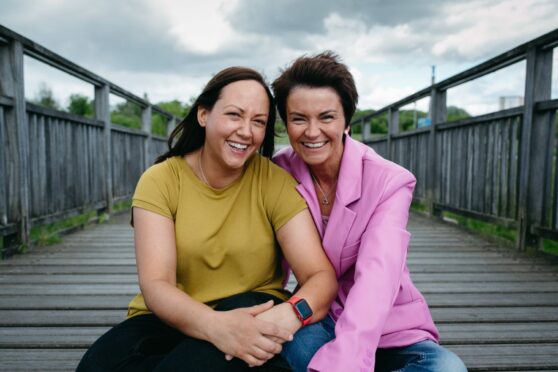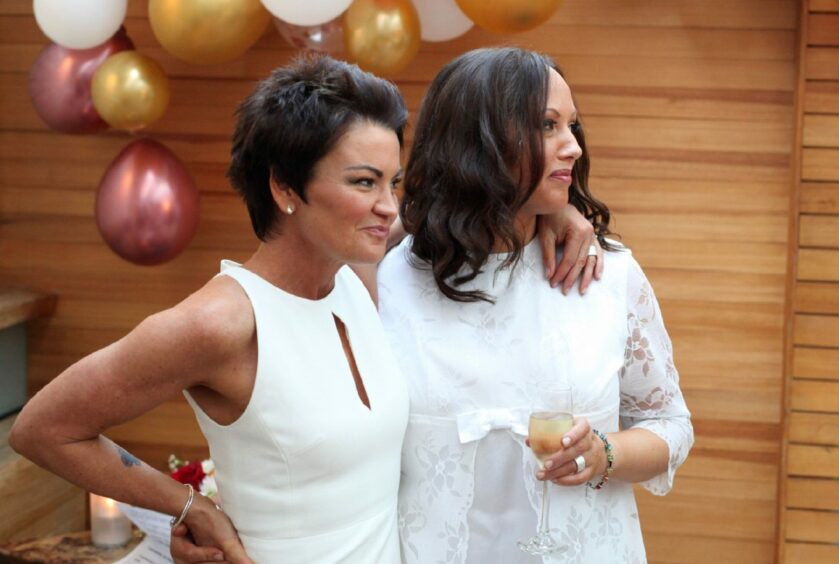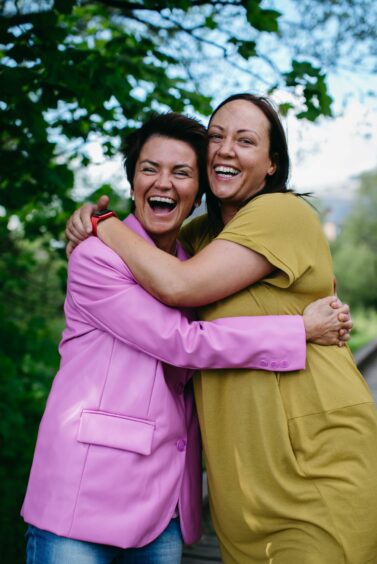
When Fiona and Leah Stalker got married, the happy couple had a new spin on some old traditions with something old, something new, something borrowed and something to ease the symptoms of menopause.
Both were wearing hormone replacement patches on their big day and today also reveal their shared experience of endometriosis to highlight the need for more discussion around women’s health issues.
Fiona, a BBC journalist and broadcaster, said: “Being a female couple, we just ‘get it’. We know each other really well because we talk through everything and menopause has been no different.”
She has been highlighting women’s health issues since being diagnosed with endometriosis – a condition where tissue similar to the lining of the womb starts to grow in other places, such as the ovaries and fallopian tubes.
“I was diagnosed in my 30s, after 15 years of agonising pain,” she said. “Imagine a hot knife being dragged across your stomach. That’s the best way I can describe what endometriosis feels like.
“The condition left me weeping each month, curled up on the floor, fearing something was very wrong with my body and, sometimes, that I was losing my mind. It impacted my work, my relationships, my mental health and my exercise.
“I saw Leah in acute pain for weeks every month. The symptoms were so horribly familiar. She’d accepted debilitating pain for decades as ‘normal’. It hadn’t occurred to her that pain that led to middle-of-the-night A&E visits wasn’t simply ‘painful periods’. I nagged her to get diagnosed.”
Mum-of-two Leah, 42, said: “People said it would get better after I had kids but it didn’t. I had always had painful periods since I was a teen. I had seen the doctor and was hospitalised.
“In my 30s, my periods were getting out of control. They were 12 days long and really painful. I wasn’t even on a 28-day cycle, they would come quite frequently.
“I did a lot of driving for work and would constantly need a hot water bottle, or to put the heated seats on to help with the pain. I was in agony but it became a pain I got used to. I just got on with it. When I met Fiona, I told her about it and she said, ‘I think you have endometriosis’.
“I was starting to feel like it was all in my head. The more I thought about it though, the more I realised it ticked all the boxes.”
Leah, a trade union officer, went to her GP. She was on a waiting list to see a gynaecologist when the pandemic hit and everything was cancelled. “Finally last year I got an operation. I had a laparoscopy and afterwards the surgeon confirmed it was endometriosis. I burst into tears. It was such a relief.
“Throughout the journey, some doctors were really understanding but others were very dismissive.”
Before surgery Fiona, 51, had to inject Leah with Decapeptyl hormones to stop the endometriosis from growing. The hormones put her into a chemical menopause, which is temporary and reversible.
Fiona said: “That was the most romantic thing I have ever done for her – I had to text a medical friend to send a diagram of a buttock to show me where and how to do the injection!”
As a result of the chemical menopause, Leah was prescribed HRT. “When I started it, I realised everything felt better,” she said. “My mood was better, I wasn’t having massive ups and downs. That’s when it dawned on me I was perimenopausal. The HRT made a massive difference.
“I think the perimenopause actually started in my 30s. My GP agreed I should stay on HRT. I went on to a tablet form last April and in January, switched to patches.”
Both Leah and Fiona have a Mirena coil for the progesterone and use body-identical HRT Estradot patches to control their estrogen levels.
Fiona was diagnosed with the menopause 18 months ago and it was Leah who spotted the signs. “She noticed my moods were up and down and that I wasn’t sleeping. When the hot flushes started, that was the warning,” said Fiona.
“I went to my GP and there was no hesitation about prescribing HRT. And it is wonderful. We have alarms set and change our patches on the same day. It has just become part of our routine. We remind each other and, as we’re on the same one, can even share the patches.
“One of the most romantic things Leah has ever done for me was give me her last HRT patch!
“I ran out and, after just three days, I was having hot flushes. It’s just amazing how quickly it works and how different things are without them.”
The pair say being a female couple has definitely helped. “There is a greater understanding what your other half is going through, and empathy, which is so important,” added Fiona.
“I know how chronically painful endometriosis can be. Leah didn’t have to explain it. There was never a doubt in my mind. Women talk to friends a lot about the menopause. We talk about it with friends too but we talk about it with each other.
“We literally go to the chemist to pick up prescriptions for Mrs and Mrs. It’s a routine now, just part of our lives. We have a laugh about it, like when the HRT patches take off our spray tan.
“We would encourage any woman who even thinks there might be an issue to speak to their doctor about the menopause or perimenopause.
“Awareness is key. We need to talk about it. My friend’s 12-year-old son recently asked why everyone was talking about this thing called the menopause. So she sat him down, along with her 11-year-old daughter and told them about it.
“It doesn’t necessarily have to be something that’s going to happen to you but everyone should know about it. There should be more women’s health issues in the school curriculum.
“We have friends who are not in a good place and either too anxious about HRT – or can’t get access to it.
“The BBC has normalised menopause for me, with people like Jackie Bird, Kirsty Wark and Kaye Adams talking about it. Just last week, the BBC signed up to a menopause in the workplace pledge. And they run a menopause cafe every three weeks where anyone can turn up and just chat about it.
“I would love to see employers do more about the menopause and talk about it more. These kinds of things destigmatise it.
“It’s about women’s quality of life, and your health is everything. Every woman will go through it so they should have the healthcare they need.”
Leah added: “I’ve seen women with the menopause trying to live with their symptoms, and working for employers who just don’t understand it. Women shouldn’t feel they should just ‘put up with it’.”

Enjoy the convenience of having The Sunday Post delivered as a digital ePaper straight to your smartphone, tablet or computer.
Subscribe for only £5.49 a month and enjoy all the benefits of the printed paper as a digital replica.
Subscribe
